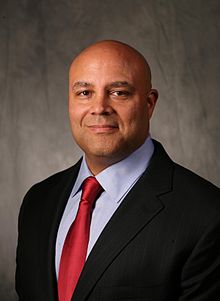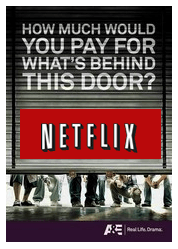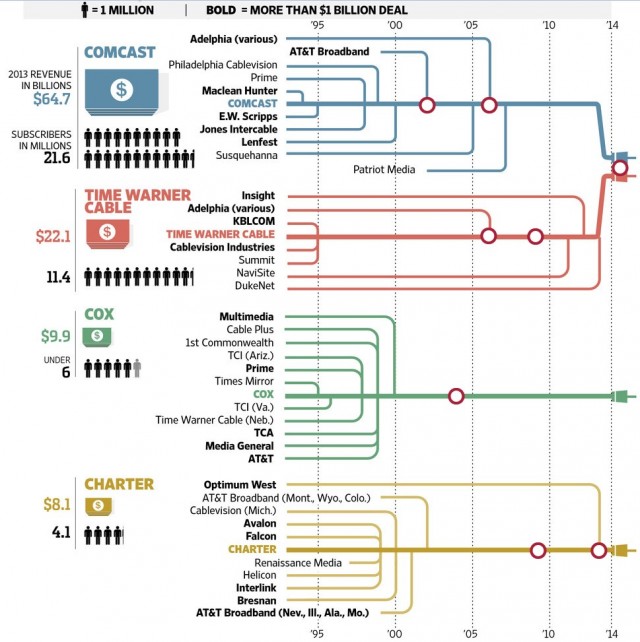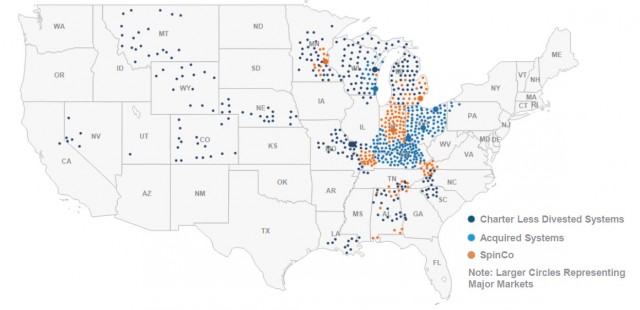
Powell: Cable is more reliable than clean water.
Michael Powell, former chairman of the Federal Communications Commission, today slammed government’s attempts to regulate broadband by contrasting the reliability of unregulated cable systems against the government’s performance in maintaining essential utilities and infrastructure.
“It is the Internet’s essential nature that fuels a very heated policy debate that the network cannot be left in private hands and should instead be regulated as a public utility, following the example of the interstate highway system, the electric grid and drinking water,” Powell told attendees at the opening of the Cable Show in Los Angeles. “The intuitive appeal of this argument is understandable, but the potholes visible through your windshield, the shiver you feel in a cold house after a snowstorm knocks out the power, and the water main breaks along your commute should restrain one from embracing the illusory virtues of public utility regulation.”
Powell says the cable industry has done a better job maintaining reliable service than the government’s municipal water, electric utilities, and public road maintenance.
“There are an estimated 240,000 water main breaks per year in need of a trillion-dollar fix in the water system,” Powell said. “In 2011, there were 307 major blackouts. Can you imagine if the Internet blacked-out 300 times a year? One in three roads are in bad shape, while ISP’s have invested $1.3 trillion in their networks since 1996 to make them world-class and at speeds that have increased 1,500 percent in the last decade.”

Powell
Powell used to be a part of the government he now criticizes, serving as FCC chairman during the first term of President George W. Bush. He is now the head of the National Cable & Telecommunications Association, the cable industry’s largest trade group.
Powell called the cable industry instrumental to creating a better society.
“I believe the cable industry can and does make the world a better place,” Powell said. “I believe our work is a good business but it also serves a higher purpose. We nurture the soil of modern community, and there lays the hope and opportunity of a better future. We are able stewards of that future. Much is being asked of us and we strive rightfully and earnestly to answer that call.”
Many of the NCTA’s largest members also belong to the American Legislative Exchange Council (ALEC), a corporate-funded group that opposes increased government spending and oversight.
Comcast and Time Warner Cable have both funded conservative groups dedicated to cutting taxes and reducing government spending.
There are an estimated 240,000 water main breaks per year in need of a trillion-dollar fix in the water system, he said, and the “suffering” electric grid is in desperate need of almost that much–“In 2011, there were 307 major blackouts,” he said. “Can you imagine if the Internet blacked-out 300 times a year?”One in three roads are in bad shape, he added. Meanwhile, ISP’s have invested $1.3 trillion in their networks since 1996 to make them world class and at speeds that have increased 1,500 percent in the last decade.
– See more at: http://www.multichannel.com/news/technology/cable-show-powell-nets-are-conduit-better-society/374220#sthash.CN2vC5TW.dpuf
“It is the Internet’s essential nature that fuels a very heated policy debate that the network cannot be left in private hands and should instead be regulated as a public utility, following the example of the interstate highway system, the electric grid and drinking water,” he told the crowd. “The intuitive appeal of this argument is understandable, but the potholes visible through your windshield, the shiver you feel in a cold house after a snowstorm knocks out the power, and the water main breaks along your commute should restrain one from embracing the illusory virtues of public utility regulation.”
There are an estimated 240,000 water main breaks per year in need of a trillion-dollar fix in the water system, he said, and the “suffering” electric grid is in desperate need of almost that much–“In 2011, there were 307 major blackouts,” he said. “Can you imagine if the Internet blacked-out 300 times a year?”One in three roads are in bad shape, he added. Meanwhile, ISP’s have invested $1.3 trillion in their networks since 1996 to make them world class and at speeds that have increased 1,500 percent in the last decade.
– See more at: http://www.multichannel.com/news/technology/cable-show-powell-nets-are-conduit-better-society/374220#sthash.CN2vC5TW.dpuf
“It is the Internet’s essential nature that fuels a very heated policy debate that the network cannot be left in private hands and should instead be regulated as a public utility, following the example of the interstate highway system, the electric grid and drinking water,” he told the crowd. “The intuitive appeal of this argument is understandable, but the potholes visible through your windshield, the shiver you feel in a cold house after a snowstorm knocks out the power, and the water main breaks along your commute should restrain one from embracing the illusory virtues of public utility regulation.”
There are an estimated 240,000 water main breaks per year in need of a trillion-dollar fix in the water system, he said, and the “suffering” electric grid is in desperate need of almost that much–“In 2011, there were 307 major blackouts,” he said. “Can you imagine if the Internet blacked-out 300 times a year?”One in three roads are in bad shape, he added. Meanwhile, ISP’s have invested $1.3 trillion in their networks since 1996 to make them world class and at speeds that have increased 1,500 percent in the last decade.
– See more at: http://www.multichannel.com/news/technology/cable-show-powell-nets-are-conduit-better-society/374220#sthash.CN2vC5TW.dpuf


 Subscribe
Subscribe Netflix has reached an agreement with Verizon Communications for a paid-peering interconnection between the two that will help assure Verizon’s broadband customers can watch Netflix content without repeated buffering slowdowns.
Netflix has reached an agreement with Verizon Communications for a paid-peering interconnection between the two that will help assure Verizon’s broadband customers can watch Netflix content without repeated buffering slowdowns.
 If you are a Time Warner Cable customer, one of four things will happen by this time next year:
If you are a Time Warner Cable customer, one of four things will happen by this time next year:
 Charter will take over directly in Ohio, Kentucky, Wisconsin, Indiana and Alabama.
Charter will take over directly in Ohio, Kentucky, Wisconsin, Indiana and Alabama.
 A 2011 state law largely written by Time Warner Cable will likely keep Charlotte, N.C. waiting for fiber broadband that nearby Salisbury has had since 2010.
A 2011 state law largely written by Time Warner Cable will likely keep Charlotte, N.C. waiting for fiber broadband that nearby Salisbury has had since 2010.

